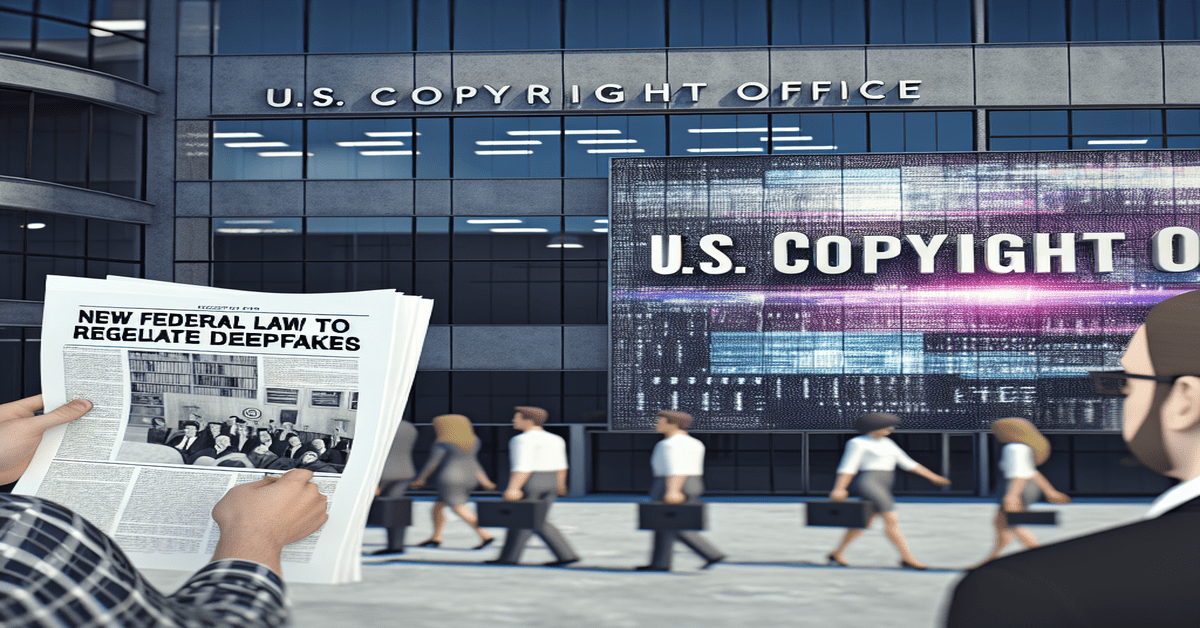The Rise of Deepfakes: U.S. Copyright Office Calls for Federal Regulation
In recent years, the rapid advancement of artificial intelligence (AI) has given rise to a new phenomenon: deepfakes. These highly realistic but fabricated videos and images have the potential to deceive and mislead on an unprecedented scale. As the technology behind deepfakes becomes more sophisticated and accessible, concerns about their misuse have grown exponentially. In response to this growing threat, the U.S. Copyright Office has taken a bold stance, calling for the implementation of a new federal law to regulate deepfakes.
Understanding the Deepfake Dilemma
Deepfakes are created using advanced AI algorithms that analyze vast amounts of visual data to generate convincing replicas of real people. By learning patterns and characteristics from existing images and videos, these algorithms can seamlessly superimpose a person’s likeness onto another individual or create entirely fabricated scenes. The results are often indistinguishable from authentic content, blurring the lines between reality and fiction.
While the technology behind deepfakes has legitimate applications in fields such as entertainment and education, it also poses significant risks. Malicious actors can employ deepfakes to spread misinformation, manipulate public opinion, and even commit fraud. In the realm of intellectual property, deepfakes can be used to create unauthorized representations of individuals, infringing upon their rights and damaging their reputations.
The Call for Federal Regulation
Recognizing the urgent need to address the challenges posed by deepfakes, the U.S. Copyright Office has taken a proactive approach. In a recent statement, the office emphasized the importance of implementing a comprehensive federal law to regulate the creation and dissemination of deepfakes.
The proposed legislation would aim to strike a balance between fostering innovation and protecting the rights of individuals and content creators. By establishing clear guidelines and penalties for the misuse of deepfake technology, the law would deter malicious actors and provide a framework for holding them accountable.
Protecting Intellectual Property Rights
One of the primary concerns highlighted by the U.S. Copyright Office is the potential for deepfakes to infringe upon intellectual property rights. When a person’s likeness is used without their consent to create a deepfake, it can constitute a violation of their right to publicity and copyright.
Under the proposed federal law, content creators would have the ability to take legal action against those who use their intellectual property in deepfakes without permission. This would not only protect the rights of individuals but also incentivize the responsible use of the technology.
Combating Misinformation and Deception
Another critical aspect of the proposed legislation is its focus on preventing the spread of misinformation through deepfakes. In an era where fake news can spread rapidly across social media platforms, the ability to create convincing deepfakes poses a significant threat to public discourse and democratic processes.
By imposing penalties on those who create and distribute deceptive deepfakes, the federal law would aim to curb the proliferation of false information. It would also encourage platforms to implement robust detection and moderation systems to identify and remove malicious deepfakes.
Balancing Innovation and Regulation
While the call for federal regulation of deepfakes is a step in the right direction, it is essential to strike a delicate balance between protecting rights and fostering innovation. The development of deepfake technology has the potential to revolutionize various industries, from entertainment to education.
The proposed legislation should provide clear exemptions for legitimate uses of deepfakes, such as parody, satire, and artistic expression. It should also encourage collaboration between government, industry, and academia to develop technical solutions for detecting and mitigating the impact of malicious deepfakes.
Conclusion
The rise of deepfakes presents both opportunities and challenges for our society. As the technology continues to evolve, it is crucial that we proactively address the potential risks it poses to intellectual property rights, public discourse, and individual privacy.
The U.S. Copyright Office’s call for a new federal law to regulate deepfakes is a **significant** step towards creating a framework for responsible innovation and protecting the rights of content creators and individuals. By **engaging** in open dialogue and collaboration, we can work towards finding a balance that allows us to harness the benefits of deepfake technology while mitigating its potential harms.
As we navigate this new frontier, it is essential that we remain **vigilant** and **adaptable**. The proposed federal legislation is just the beginning of a larger conversation about how we can shape the future of AI and deepfakes. It is up to all of us – policymakers, industry leaders, and citizens alike – to actively participate in this discussion and work towards building a future where innovation and responsibility go hand in hand.
#Deepfakes #IntellectualProperty #AIRegulation #Misinformation #ResponsibleInnovation #Deepfake
- Original article and inspiration provided by Nilay Patel
- Connect with one of our AI Strategists today at Opahl Technologies


